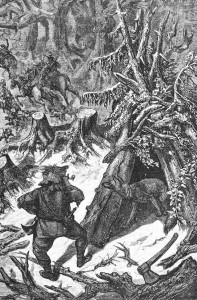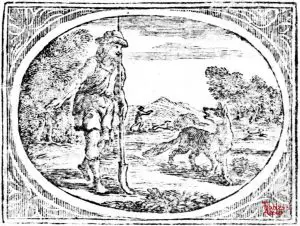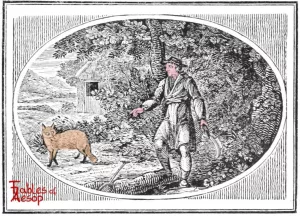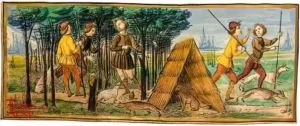A Fox sought and was granted shelter in a home. Huntsmen asked about the Fox; the owner denied seeing one but pointed at the house. Fox lucky signal missed.
Conscience is as answerable for actions as words.

JBR Collection
A Fox having been hunted hard, and run a long chase, saw a Countryman at work in a wood, and begged him to help him to some hiding-place. The man said he might go into his cottage, which was close by. He was no sooner in, than the Huntsmen came up. “Have you seen a Fox pass this way?” said they. The Countryman said “No, but pointed at the same time towards the place where the Fox lay. The Huntsmen did not take the hint, however, and made off again at full speed. The Fox, who had seen all that took place through a chink in the wall, thereupon came out, and was walking away without a word. “Why, how now?” said the man; “haven’t you the manners to thank your host before you go?” “Yes, yes,” said the Fox; “if you had been as honest with your finger as you were with your tongue, I shouldn’t have gone without saying good-bye.”

Townsend version
A fox, running before the hounds, came across a Woodcutter felling an oak and begged him to show him a safe hiding-place. The Woodcutter advised him to take shelter in his own hut, so the Fox crept in and hid himself in a corner. The huntsman soon came up with his hounds and inquired of the Woodcutter if he had seen the Fox. He declared that he had not seen him, and yet pointed, all the time he was speaking, to the hut where the Fox lay hidden. The huntsman took no notice of the signs, but believing his word, hastened forward in the chase. As soon as they were well away, the Fox departed without taking any notice of the Woodcutter: whereon he called to him and reproached him, saying, “You ungrateful fellow, you owe your life to me, and yet you leave me without a word of thanks.” The Fox replied, “Indeed, I should have thanked you fervently if your deeds had been as good as your words, and if your hands had not been traitors to your speech.”

Samuel Croxall (The Fox, and the Countryman)
A Fox being hard hunted, and having run a long chace, was quite tired; at last he spied a Country fellow in a wood, to whom he applied for refuge, entreating that he would give him leave to hide himself in his cottage, till the hounds were gone by. The Man consented, and the Fox went and covered himself up close in a corner of the hovel. Presently the hunters came up, and enquired of the Man, if he had seen the Fox. No, says he I have not seen him indeed: but all the while he pointed with his finger to the place where the Fox was hid. However, the hunters did not understand him, but called off their hounds, and went another way. Soon after, the Fox, creeping out of his hole, was going to sneak off; when the man, calling after him, asked him, if that was his manners, to go away without thanking his benefactor, to whose fidelity he owed his life. Reynard, who had peeped all the while, and seen what passed, answered, I know what obligations 1 have to you well enough; and I assure you, if your actions had but been agreeable to your words, I should have endeavoured, however incapable of it, to have returned you suitable thanks.
THE APPLICATION
Sincerity is a most beautiful virtue; but there are some, whose natures are so poor spirited and cowardly, that they are not capable of exerting it. Indeed, unless a man be steady and constant in all his actions, he will hardly deserve the name of sincere. An open enemy, though more violent and terrible, is not, however, so odious and detestable as a false friend. To pretend to keep another’s counsel, and appear in their interest, while underhand we are giving intelligence to their enemies, is treacherous, knavish, and base. There are some people in the world very dexterous at this kind of defamation; and can, while they seem most vehement in the commendation or defence of a friend, throw out a hint which shall stab their reputation deeper than the most malicious weapon, brandished at them in a public manner, could have been capable of doing.

Thomas Bewick (The Fox and The Countryman)
A Fox being closely pursued by the Hunters, and almost run down, begged of a Countryman to give him protection, and save his life. The Man consented, and pointed out a hovel, into which the Fox crept, and covered himself up among some straw. Presently up came the Hunters, and enquired of the Man if he had seen the Fox, and which way he had taken? No, said he, I have not seen him here, he has passed another way; but all the while he nodded with his head, and pointed with his finger to the place where the Fox was hidden. These signals the Hunters, in the eagerness of pursuit, did not notice, but calling off the dogs, they dashed along in another direction. Soon after, the Fox came out of his hiding-place, and was sneaking off, when the Man calling after him,—Hollo, says he, is this the way you behave then, to go without thanking the benefactor who has saved your life? Reynard, who had peeped all the while, and had seen what passed, answered, I know what obligation I owe you well enough, and I assure you if your actions had agreed with your words, I should have endeavoured, however incapable of it, to have returned you suitable thanks.
APPLICATION.
Dissimulation and double dealing are among the most odious vices, and a hollow friend is worse than an open enemy; for in the full confidence of friendship, we are led to depend upon the man who uses that confidence to betray us. To pretend to keep another’s council, and appear in his interest, while underhand we are giving intelligence to his enemies, is treacherous, knavish, and base. Truth is a plain and open virtue, and cannot be practised in part; and truth and sincerity are the same; wherefore he that equivocates and adheres to his promise in one sense, without preserving it inviolably in its full extent and meaning, departs as much from truth and sincerity as the most direct liar.
"And be those juggling friends no more believ'd, "That palter with us in a double sense; "That keep the word of promise to the ear, "And break it to our hope."

L’Estrange version (A Fox and Huntsmen)
A fox that had been hard-run, begg’d of a countryman that he saw at work in a wood, to help him to some hiding-place. The man directed him to his cottage, and thither he went. He was no sooner got in, but the huntsmen were presently at the heels of him, and asked the cottager if he did not see a fox that way? No truly, says he, I saw none; but pointed at the same time with his finger to the place where he lay. The huntsmen did not take the hint, but the fox spy’d him, it seems, through a peeping hole he had found out to see what news: so the foxhunters went their way, and then out steals the fox, without one word speaking. Why how now, says the man, han’t ye the manners to take leave of your host before you go? Yes, yes, says the fox; if you had been as honest of your fingers, as you were of your tongue, I should not have gone without bidding ye farewell.
Moral
A man may tell a lye by signs, as well as in words at length, and his conscience is as answerable for his fingers, as for his tongue.

Gherardo Image from 1480

Lupus Fugiens et Pastor
Cum venatorem instantem fugeret lupus, et pastor vidisset qua parte fugeret et quo se loco absconderet, ille, vehementer metuens, “Oro te, pastor,” inquit, “ne me prodas innocentem. Nihil umquam mali tibi feci.” Et pastor “Noli,” inquit, “timere; alteram venatori monstrabo partem.” Mox venator, cum advolasset, “Pastor, vidistine huc,” inquit, “lupum venientem?” Huic pastor, voce maxima, “Venit ille quidem, sed laeva fugit.” At simul, oculis clam dextram partem designat. Venator non intellexit nutum et, festinans, abiit. Tum lupum pastor interrogat, “Quam tu mihi habebis gratiam quod te celavi?” Tum ille “Maximas,” inquit, “linguae tuae gratias ago, at oculis tuis fallacibus,” secum murmurans subiecit, “talem gratiam referam, ut ex minore in dies ovium numero cognoscas – quam memor sim meriti tui!”
Perry #022



